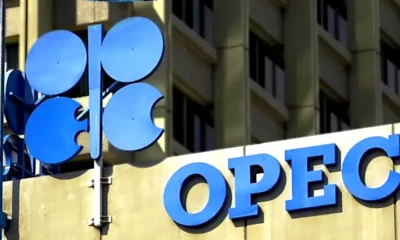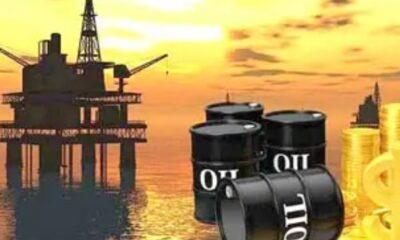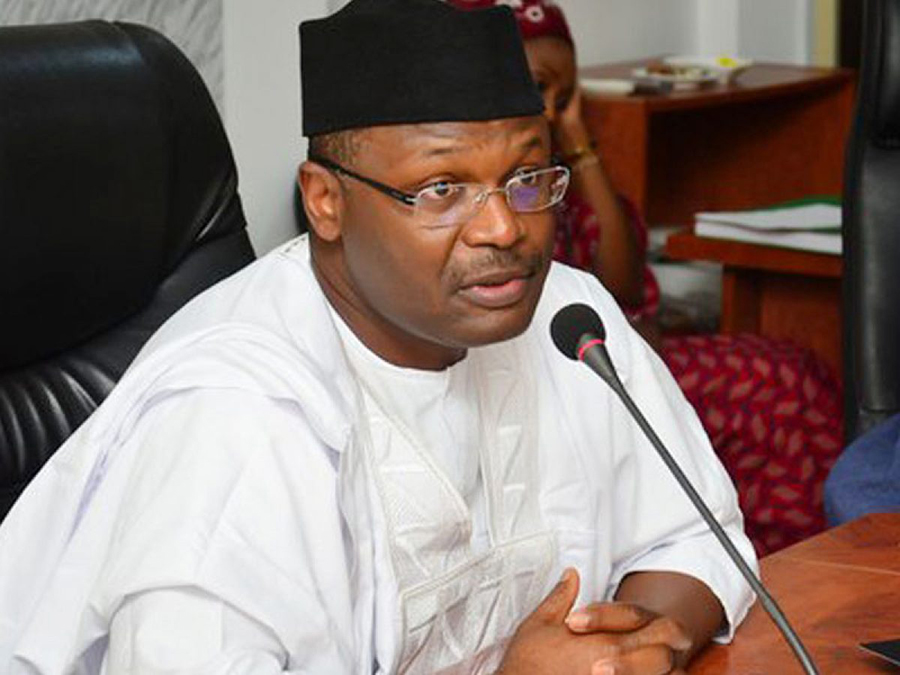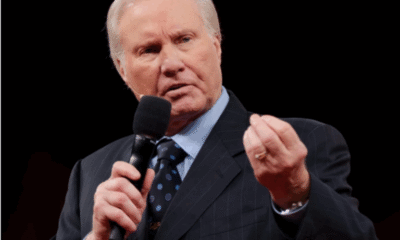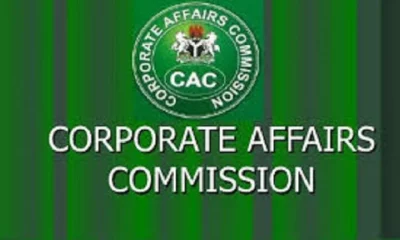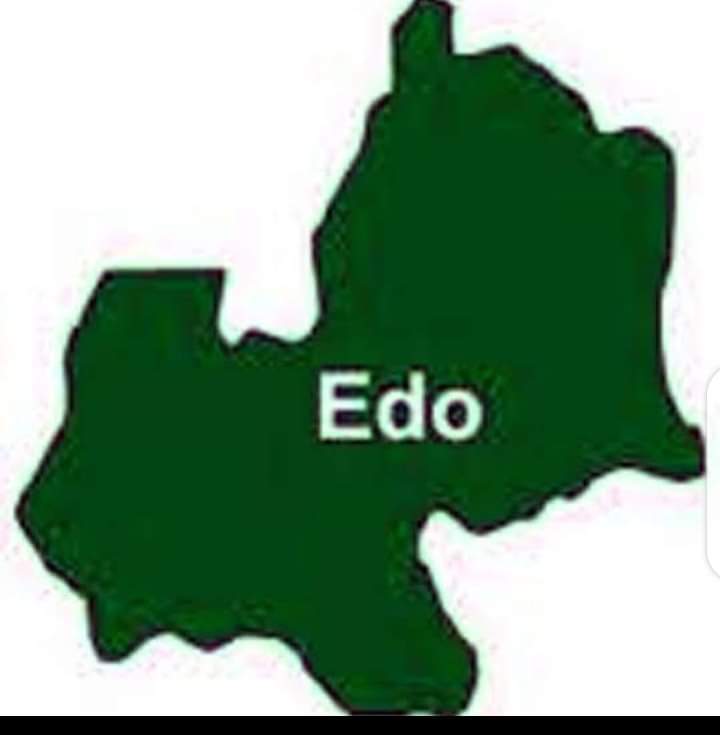Business
OPEC Cuts Nigeria’s Oil Output By 20.7% To 1.38 mb/d
Published
2 years agoon
By
Editor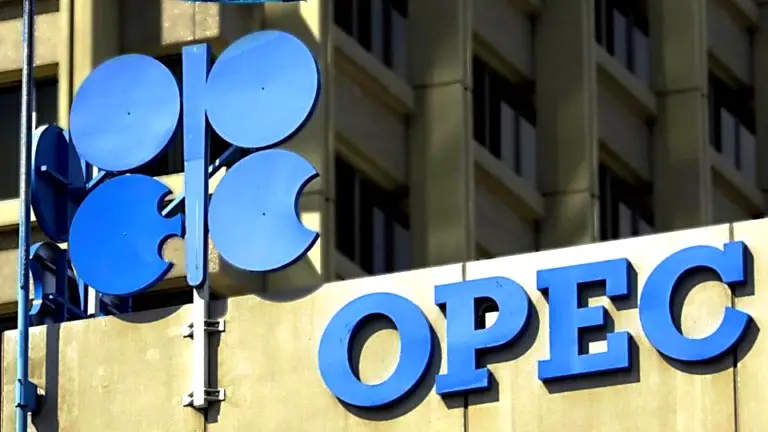
The Organisation of Petroleum Exporting Countries and its allies, popularly known as OPEC+ has slashed Nigeria’s oil output, excluding condensate by 20.7 per cent to 1.38 million barrels per day, mb/d, from 1.74 mb/d in order to achieve stability in the global market.
The decision expected to take effect from January 2024 was taken at the crucial meeting of the 49th Meeting of the Joint Ministerial Monitoring Committee (JMMC) and the 35th OPEC and non-OPEC Ministerial Meeting, in Vienna, Austria, monitored by Vanguard, yesterday.
Under the organisation’s new voluntary adjustment programme obtained by Vanguard, Saudi Arabia will produce 10.48 mb/d, apparently the highest to be produced by a single nation while Sudan will produce 64,000 bpd, the least.
The programme further indicated that OPEC members states, whose collective output stood at almost 25 mb/d still account for a bulk of the global oil output while non-OPEC countries account for 15.5 mb/d.
READ ALSO: Oil Price Rises After Shocking OPEC+ Production Cut
However, OPEC+ stated in a statement that, it remains committed to achieving stability despite many issues and problems in the global market.
It stated: “In light of the continued commitment of the OPEC and non-OPEC Participating Countries in the Declaration of Cooperation (DoC) to achieve and sustain a stable oil market, and to provide long-term guidance for the market, and in line with the successful approach of being precautious, proactive, and pre-emptive, which has been consistently adopted by OPEC and non-OPEC Participating Countries in the Declaration of Cooperation, the Participating Countries decided to reaffirm the Framework of the Declaration of Cooperation, signed on 10 December 2016 and further endorsed in subsequent meetings; as well as the Charter of Cooperation, signed on 2 July 2019.”
It also agreed to, “Adjust the level of overall crude oil production for OPEC and non-OPEC Participating Countries in the DoC to 40.46 mb/d, starting 1 January 2024 until 31 December 2024, which to be distributed as per the attached table.
“Reaffirm and extend the mandate of the Joint Ministerial Monitoring Committee (JMMC) and its membership, to closely review global oil market conditions, oil production levels, and the level of conformity with the DoC and this Statement, assisted by the Joint Technical Committee (JTC) and the OPEC Secretariat. The JMMC is to be held every two months.
“Hold the OPEC and non-OPEC Ministerial Meeting (ONOMM) every six months in accordance with the ordinary OPEC scheduled conference.
READ ALSO: Again, OPEC Increases Nigeria’s Crude Oil Production Quota To 1.8mbpd
“Grant the JMMC the authority to hold additional meetings or to request an OPEC and non-OPEC Ministerial Meeting at any time to address market developments, whenever deemed necessary.“
“Reaffirm that the DoC conformity is to be monitored considering crude oil production, based on the information from secondary sources, and according to the methodology applied for OPEC Member Countries.
“Reiterate the critical importance of adhering to full conformity, and subscribe to the concept of compensation by those countries who produce above the required production level as per the attached table, in addition to their already decided production levels.”
VANGUARD
You may like


OPEC+ Countries To Hike Oil Production In June


Nigeria’s Oil Production Drops Again, Now 1.23mbpd – OPEC


Crude Prices Drop After Angola Quits OPEC


Oil Drops Further After OPEC Delay With Asian Stocks Mixed


Oil Price Rises To $92.79 On Output Cut, May Hit $107


Oil Price Rises After Shocking OPEC+ Production Cut

The Naira experienced a slight depreciation on Friday at the official market, trading at N1,528.56 to the dollar.
Data obtained from the website of the Central Bank of Nigeria (CBN) showed that the Naira lost N2.73.
This represents a 0.17 percent loss compared to the N1,525.82 recorded on Thursday.
READ ALSO:Naira Appreciates At Official Market
The Naira, which opened the week on Monday with a gain of N9.52 against the dollar, held steady gains until Thursday.
On Wednesday, the local currency gained N3.42 against the dollar and received commendation from the International Monetary Fund (IMF).
The IMF, in its 2025 Article IV Consultation report on Nigeria, commended the CBN for its reforms to the foreign exchange market, which supported price discovery and liquidity.
Business
JUST IN: Dangote Refinery Hikes Petrol Ex-depot Price
Published
2 weeks agoon
June 20, 2025By
Editor
Nigerians may soon pay more for petrol as the Dangote Petroleum Refinery on Friday increased its ex-depot price for Premium Motor Spirit to N880 per litre, raising fresh concerns over fuel affordability and price volatility in the downstream sector.
Checks on petroleumprice.ng, a platform tracking daily product prices, and a Pro Forma Invoice seen by The PUNCH confirmed the hike, representing a N55 increase from the previous rate of N825 per litre.
The increment would ripple across the entire fuel distribution chain, likely pushing pump prices above N900/litre in some parts of the country, especially in areas far from the distribution hubs.
The hike comes despite global crude prices falling. Brent crude dipped by 3.02% to $76.47, WTI fell to $74.93, and Murban dropped to $76.97 on Friday. The decline in benchmarks offers little relief due to persistent fears of sudden supply disruptions.
READ ALSO: JUST IN: Dangote Refinery Sashes Petrol Gantry Price
The refinery has increased its reliance on imported U.S. crude and operational costs amid exchange rate instability, which adds to its pricing pressure.
On Thursday, the President of the Dangote Group, Aliko Dangote, said his 650,000-barrel capacity refinery is “increasingly” relying on the United States for crude oil.
This came as findings showed that the Dangote Petroleum Refinery is projected to import a total of 17.65 million barrels of crude oil between April and July 2025, beginning with about 3.65 million barrels already delivered in the past two months, amid ongoing allocations under the Federal Government’s naira-for-crude policy.
Dangote informed the Technical Committee of the One-Stop Shop for the sale of crude and refined products in naira initiative that the refinery was still battling crude shortages, which had led it to resort to imports from the United States.
READ ALSO:Dangote Stops Petrol Sale In Naira, Gives Condition For Resumption
On Monday, the president of the Petroleum and Natural Gas Senior Staff Association of Nigeria, Festus Osifo, accused oil marketers of exploiting Nigerians through inflated petrol prices, insisting that the current pump price of PMS should range between N700 and N750 per litre.
He criticised the disparity between falling global crude oil prices and the stagnant retail price of petrol in Nigeria.
“If you go online and check the PLAT cost per cubic metre of PMS, convert that to litres and then to our Naira, you will see that with crude at around $60 per barrel, petrol should be retailing between N700 and N750 per litre.”
He asserted that if Nigerians bear the brunt of higher fuel costs, they should be allowed to enjoy the benefit of low pricing.
His forecast of increased costs now appears spot on, considering the latest developments.
Marketers are already adjusting. Depot owners and fuel distributors in Lagos and other cities anticipate a domino effect, with new price bands expected to follow Dangote’s lead.
Many had held back pricing decisions since Tuesday, when the refinery halted sales and withheld fresh PFIs. The delay fueled speculation, allowing opportunistic price hikes across various depots.

The Naira, which has seen steady appreciation against the Dollar all week, closed stronger on Friday, trading at ₦1,580.44 in the official forex market.
Data from the Central Bank of Nigeria’s website show the Naira gained ₦4.51k against the Dollar on Friday alone.
This marks a 0.28 per cent appreciation from Thursday’s closing rate of ₦1,584.95 in the official foreign exchange window.
The local currency maintained consistent strength throughout the week, recording gains daily.
READ ALSO: Naira Appreciates Against Dollar At Foreign Exchange Market
On Monday, May 19, it traded at ₦1,598.68; on Tuesday, at ₦1,590.45; and on Wednesday, at ₦1,584.49.
These gains suggest increased investor confidence and improved forex supply, contributing to the naira’s performance.
Meanwhile, the CBN, at its 300th Monetary Policy Committee meeting held Monday and Tuesday, retained the Monetary Policy Rate at 27.5 per cent.
- Police Pension Scheme Violates Constitution, IHRC Tells Tinubu
- FG To Spend N17bn On Lagos Bridge Damaged By Fire
- Ex-Army Chief Proposes Mandatory Military Training For Nigerians
- Australian Actor Julian McMahon Is Dead
- Thai Police Rescue Eight-year-old Boy Living With Dogs, Unable To Speak
- Oyo Fixes Date For Common Entrance Exam
- ‘He Wants To Keep Killing People,’ Trump ‘Very Unhappy’ After Phone Discussion With Putin On Ukraine
- Human Trafficking: Police Rescue 40 Ghanaians, Arrest Three In Ondo
- Fuel Station Manager, Three Others Arrested For Robbery
- Police Arrest Cleric Over Alleged Defilement Of Underage Girl In Osun
About Us
Trending

 Sports3 days ago
Sports3 days agoBREAKING: Liverpool Star Diogo Jota Is Dead

 News4 days ago
News4 days agoSenator Withdraws From Legislative Duties Over Health Challenge

 Politics4 days ago
Politics4 days agoINEC Unveils 2025-2026 Election Timetable, Resumes Voter Registration

 Headline4 days ago
Headline4 days agoUS-based Lawyer Becomes First Nigerian To Travel To Space

 Politics3 days ago
Politics3 days agoEdo: S’Court Reserves Verdict On Ighodalo’s Case Against Okpebholo

 Metro4 days ago
Metro4 days agoCleric Jailed 53 years For Sexually Assaulting 14-year-old Daughter

 Headline4 days ago
Headline4 days agoAU Helicopter Crashes In Somali Capital – State Media

 Headline4 days ago
Headline4 days agoTelevangelist, Jimmy Swaggart, Is Dead

 News4 days ago
News4 days agoCAC Unveils AI-powered Portal For 30-minute Company Registrations

 Metro3 days ago
Metro3 days agoControversy Over Pregnant Woman Buried Alive In Edo
